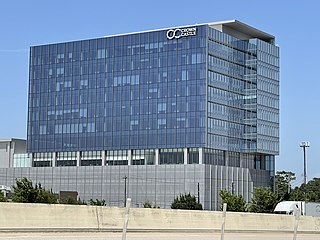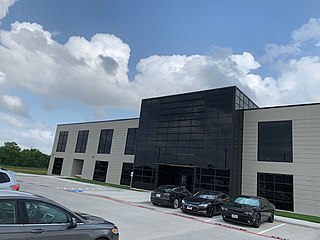
A Regional Bell Operating Company (RBOC) was a corporate entity created as result of the antitrust lawsuit by the U.S. Department of Justice against the American Telephone and Telegraph Company (AT&T) in 1974 and settled in the Modification of Final Judgment on January 8, 1982.

Base station is – according to the International Telecommunication Union's (ITU) Radio Regulations (RR) – a "land station in the land mobile service."

A cell site, cell phone tower, cell base tower, or cellular base station is a cellular-enabled mobile device site where antennas and electronic communications equipment are placed to create a cell, or adjacent cells, in a cellular network. The raised structure typically supports antenna and one or more sets of transmitter/receivers transceivers, digital signal processors, control electronics, a GPS receiver for timing, primary and backup electrical power sources, and sheltering.

Crown Castle Inc. is a real estate investment trust and provider of shared communications infrastructure in the United States headquartered in Houston, Texas. Operating with 100 offices worldwide, its network includes over 40,000 cell towers and approximately 85,000 route miles of fiber supporting small cells and fiber systems.

GCI Communication Corp. (GCI) is a telecommunications corporation operating in Alaska. Through its own facilities and agreements with other providers, GCI provides cable television service, Internet access, wireline (networking), and cellular telephone service. It is a subsidiary of Colorado-based company Liberty Broadband, a company affiliated with Liberty Media that also owns a 26% interest in Charter Communications, having been originally acquired by Liberty in 2015.
In a hierarchical telecommunications network, the backhaul portion of the network comprises the intermediate links between the core network, or backbone network, and the small subnetworks at the edge of the network.

Sierra Wireless is a Canadian multinational wireless communications equipment designer, manufacturer and services provider headquartered in Richmond, British Columbia, Canada. It also maintains offices and operations in the United States, Korea, Japan, Taiwan, India, France, Australia and New Zealand.

Cambium Networks Corporation is a wireless infrastructure provider that offers fixed wireless and Wi-Fi to broadband service providers and enterprises to provide Internet access. An American telecommunications infrastructure company, it provides wireless technology, including Enterprise WiFi, switching solutions, Internet of Things, and fixed wireless broadband and Wi-Fi for enterprises. Publicly traded on the NASDAQ stock exchange, it spun out of Motorola in October 2011.
The Educational Broadband Service (EBS) was formerly known as the Instructional Television Fixed Service (ITFS). ITFS was a band of twenty (20) microwave TV channels available to be licensed by the U.S. Federal Communications Commission (FCC) to local credit granting educational institutions. It was designed to serve as a means for educational institutions to deliver live or pre-recorded Instructional television to multiple sites within school districts and to higher education branch campuses. In recognition of the variety and quantity of video materials required to support instruction at numerous grade levels and in a range of subjects, licensees were typically granted a group of four channels. Its low capital and operating costs as compared to broadcast television, technical quality that compared favorably with broadcast television, and its multi-channel per licensees feature made ITFS an extremely cost effective vehicle for the delivery of Educational television materials.

Due to economy of scale property of telecommunication industry, sharing of telecom infrastructure among telecom service providers is becoming the requirement and process of business in the telecom industry where competitors are becoming partners in order to lower their increasing investments. The degree and method of infrastructure sharing can vary in each country depending on regulatory and competitive climate.

American Tower Corporation is an American real estate investment trust which owns, develops and operates wireless and broadcast communications infrastructure in several countries. It is headquartered in Boston, Massachusetts.

Andrew Corporation, a former hardware manufacturer for communications networks, was founded by Victor J. Andrew in the basement of his Chicago, Illinois home in 1937, and further established in Orland Park, Illinois in 1953. Andrew was a renowned global telecommunications company that played a significant role in the development of wireless communication technologies.

CommScope Holding Company, Inc. is an American network infrastructure provider based in Claremont, North Carolina. CommScope employs over 22,000 employees. The company joined the Nasdaq stock exchange on October 25, 2013.

DHI Telecom, LLC is a US commercial Internet service provider (ISP) that operates on U.S. and NATO bases in the Middle East including Iraq, Kuwait, and Afghanistan. DHI provides wired, fiber-optic cable, mobile Wi-Fi, and wireless commercial Internet access to US, coalition armed forces, direct-hire DoD, Department of the Army and State Department civilians, authorized civilian contractors, and international businesses participating in Operation New Dawn and Operation Enduring Freedom. DHI has additional operations in the UAE, Jordan, The Congo, Poland and Romania.
Towerstream Corporation is a Fixed Wireless Fiber Alternative company delivering high-speed Internet access to businesses. The company offers broadband services in 12 urban markets including New York City, Boston, Los Angeles, Chicago, Philadelphia, the San Francisco Bay area, Miami, Seattle, Dallas-Fort Worth, Houston, Las Vegas-Reno, and the greater Providence area, where the company is headquartered. In 2014, Towerstream launched its On-Net fixed-wireless service offering On-Net building tenants access to dedicated, symmetrical high-speed Internet connectivity, with a premier SLA, at market-setting prices. Founded in 1999 by Philip Urso and Jeffrey Thompson (eFortress), Towerstream held its first public offering in January 2007 and traded on the NASDAQ Capital Markets under symbol TWER. In November 2016 the stock had declined in price, was delisted from NASDAQ, and moved to the over-the-counter market.
A telecommunications lease is a lease that exists between a telecommunications provider, or a wireless company, and a landowner. Similar to other real estate leases, a telecommunications lease is put in place as an agreement to lease space on the landowner's property for a telecommunications site or cellular tower for a specified length of time. In exchange for the use of space, the telecommunications provider agrees to pay the landowner rent. Telecom leases can be excellent sources of ancillary income, in some cases providing the landowner with thousands of dollars per month.
The Wireless Infrastructure Association (WIA), formerly known as PCIA, is an American trade association for wireless providers and companies that build cell phone towers, rooftop wireless sites, and other facilities that transmit wireless communication signals. The Washington Post described the industry as "the people who build all those cell towers so you can actually make those calls, download that data." These technologies are collectively referred to as "wireless telecommunications infrastructure."
Shenandoah Telecommunications Company, doing business as Shentel, is a publicly traded telecommunications company headquartered in Edinburg, Virginia. It operates a digital wireless and wireline network in rural Virginia, West Virginia, Maryland and Pennsylvania.

Vantage Towers is a European infrastructure company headquartered in Düsseldorf, Germany. The company is involved in the construction, management, and leasing of towers, antenna masts, and other facilities to mobile network operators.













